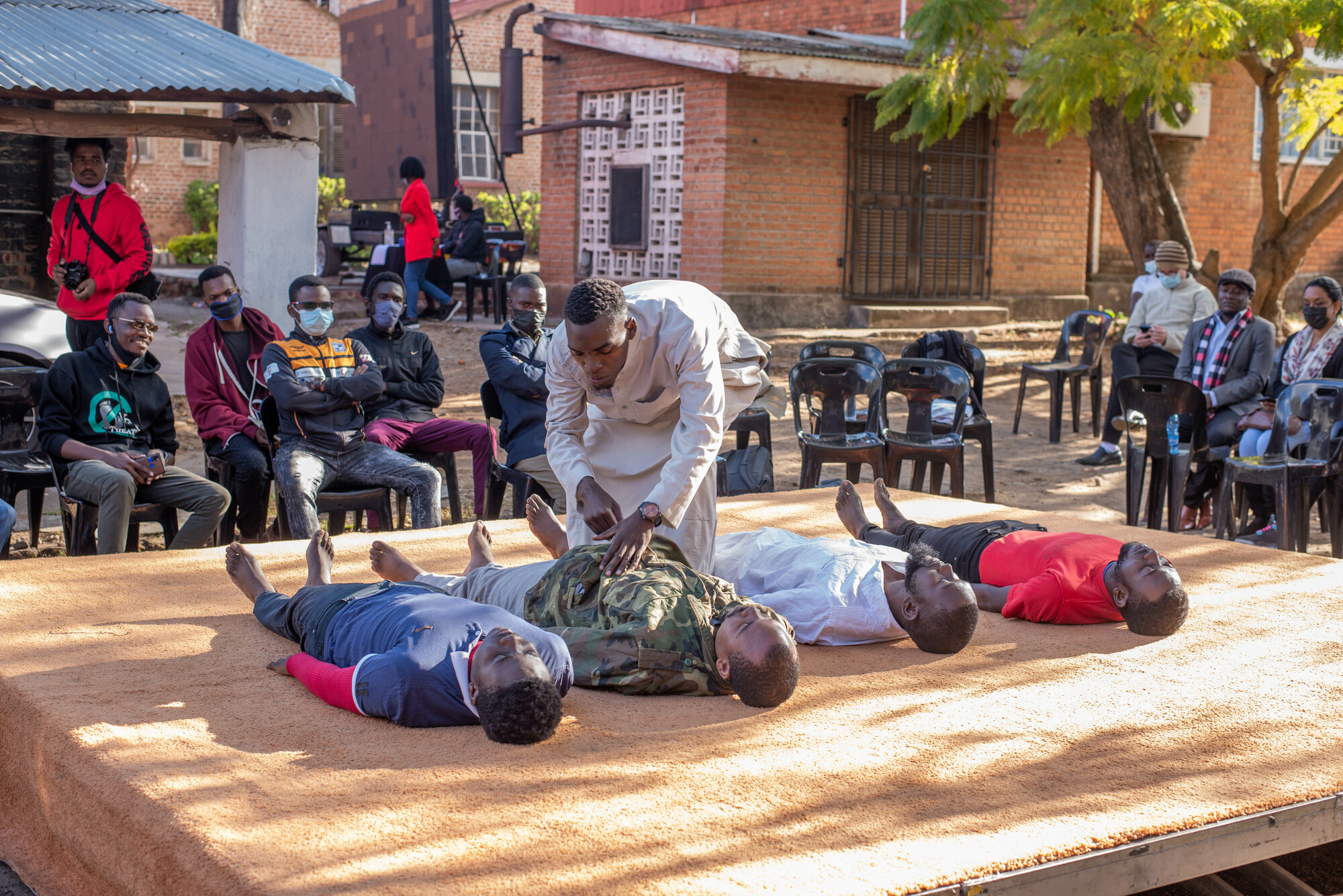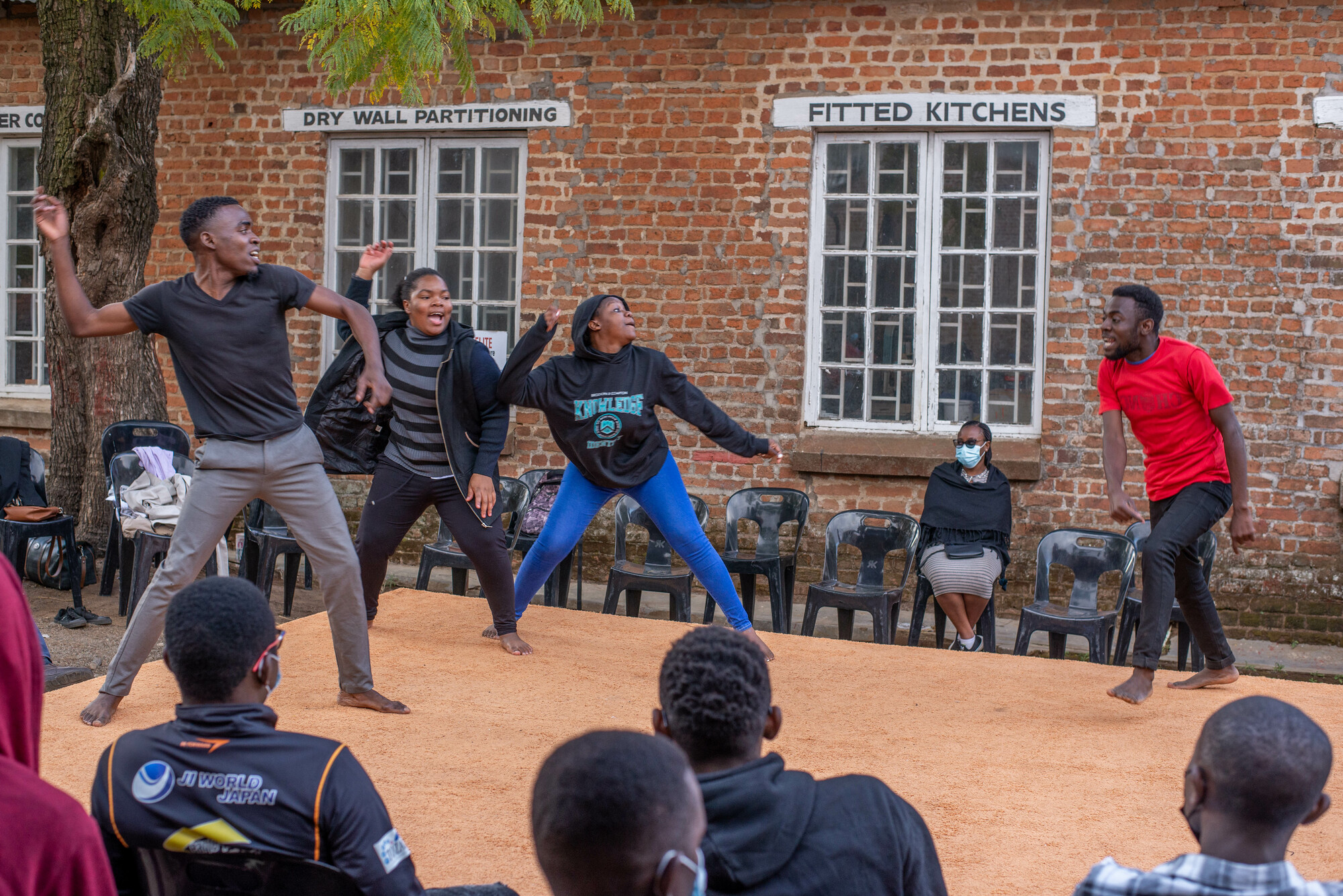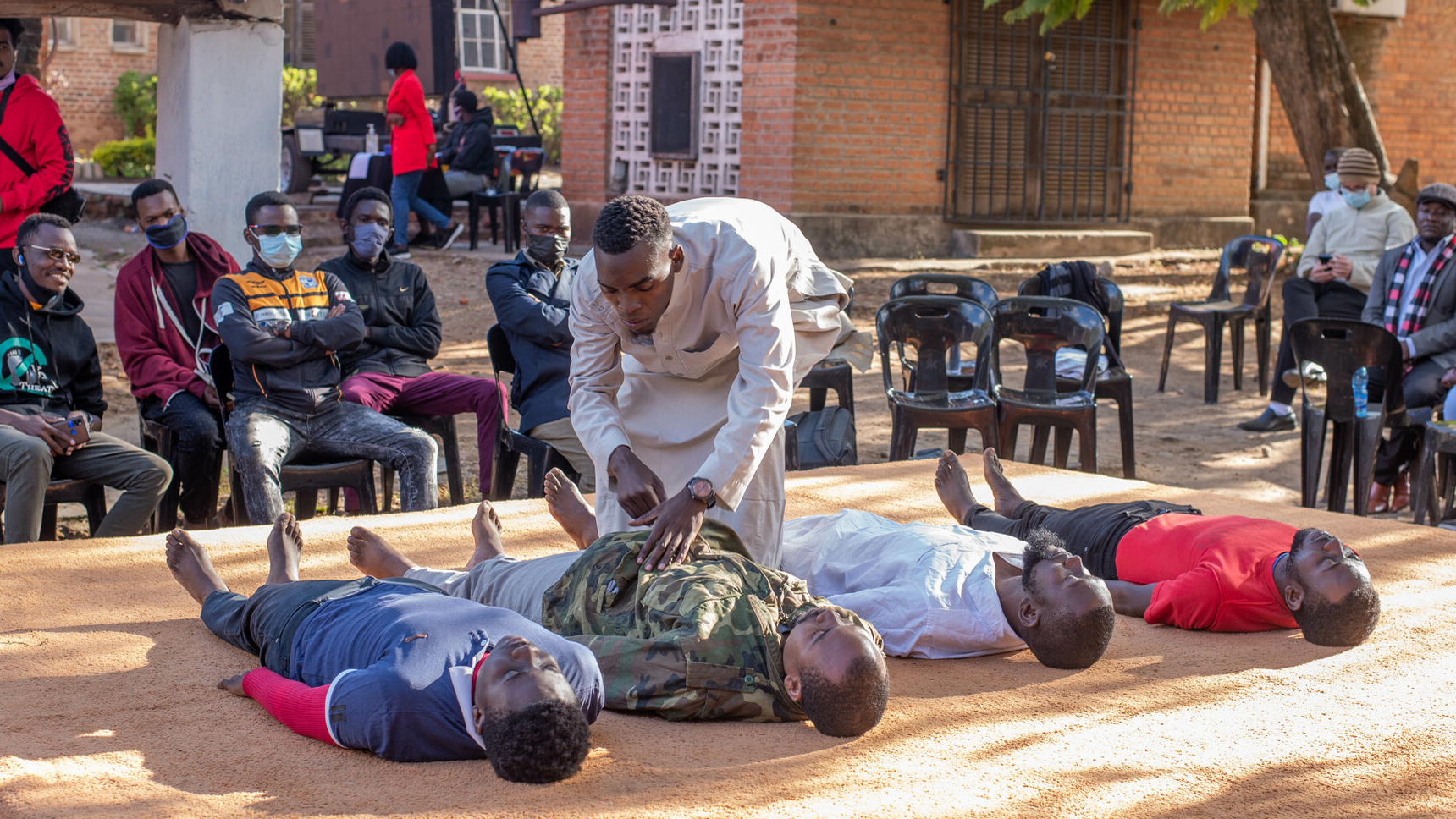A Discussion with Bright Phumayo Chayachaya
Many theatre artists and media outlets assume that theatre refrains from addressing political and human rights. In my discussion with Bright Chayachaya the founder and director of Umunthu Theatre, we talked about the politics of intermediality in Malawian theatre and Umunthu’s critical production: Sometimes in July, written by Innocent Katsache. Umunthu Theatre has been at the center of producing plays that discuss critical issues in society like politics and human rights revolutions. Our discussion navigates divergent theories of Malawian theatre in an attempt to understand how politics interrelate with human rights discourse in the democratic state.
Fumbani Innot Phiri Jr.: What is Sometimes in July about?
Bright Chayachaya: Sometimes in July by Innocent Katsache is a recollection of events of the July 20, 2011 demonstrations that led to the killing of twenty people—however it is told from the perspective of a local common man who is just a victim of the system. Basically, we wanted to tell a story about how Malawi’s current state was built. So the show dives into economic and social challenges that the nation faced due to the repressive regime that was ruling in 2011.
Fumbani: Why did you choose to stage Sometimes in July ten years after the July 20th demonstrations occurred?
Bright: It was basically a thought I had after a discussion with Tawonga Taddja Nkhonjera, the curator of the space we were provided by organizers of Theatre in Mandala, which is under Jacaranda Cultural Centre. My idea was for them to provide a space for a show in November 2019. We saw this piece as opportunity to commemorate the fallen heroes of the demonstrations, as the date fell three days before July 20th, exactly ten years after the catastrophe. Basically it was a way of commemorating the fallen heroes and a space for us to stimulate dialogue on the demonstrations that occurred.
So in 2019, the essence of staging Sometimes in July was through many reflections of the political tension that was happening after the irregularities of the Malawian presidential elections. Every week, the streets were filled with political and human rights protestors demonstrating and exercising their freedom of expression. We didn’t want to leave that behind and as Youth Developers Collaboration (YDC) Theatre was busy touring with Wasted Adjective, we thought it wise to join in on what YDC Theatre was doing and staging Sometimes in July was the key.
Fumbani: How was crafting the adaptation different from the original production? Would you explain the details of the different phases of the process—specifically story development, casting, rehearsals, contributions, and the final work?
Bright: We basically adopted the same story that was created six years ago by drama students, among them script writer Innocent Katsache, for their classwork at Chancellor College of the University of Malawi. We made a few adjustments to the original show to suit the current social and political climate of Malawi. In the same vein, we avoided removing important plot elements from the play. As a director, I believe in casting and working with people whose capabilities I’m familiar with, so I simply approached people I already knew to perform in it—except for two actors who I worked with for the first time on this production.
True to my premonition, I had challenges in advancing my ideas with them. We had one of the most difficult rehearsal processes, as I was working with a team of people who do all sorts of stuff apart from theatre. Because of this, at times, an actor would skip rehearsals which meant we could only concentrate on the roles of the actors who were available. This was even more challenging because the actors were playing multiple characters. But all in all, we managed to showcase the piece.
Crafting the production was ideal as I am used to working on improvised presentations and it was very easy to shift from style to style with minimal use of props and set. I focused on using imaginary props and a mimicking acting style. It was challenging having to block a show on a round stage with actors who were used to proscenium stages, but they adapted quickly to my blocking.

Fumbani: How has Malawian theatre been since your organization, Umunthu Theatre, joined the industry?
Bright: I started Umunthu Theatre in 2016 after I graduated from college. I would say there has been a complete revolution in Malawian theatre in terms of play creation and performance, with groups of young thespians flooding the industry. The major challenge we had was finding spaces for performances. It was hard to find a venue that would host a theatre production for a percentage of box office shares rather than providing a flat rate for booking the space, but now we are able to do shows in several available venues. Another challenge was the rigidity of the old guards—those who have been in the industry for a while—who considered a shift to new forms of performance as wrong and refused to adapt to the changing theatre landscape.
Fumbani: Do you feel hostile or afraid when you produce political plays in relation to human rights violations? How is the political and artistic environment connected to productions in Malawi?
Bright: I haven’t dived so much into serious political plays but truth be told since actor Thlupego Chisiza was arrested in 2011 for performing Semo, it’s rare for me to confidently do a very political play. I remember when we were preparing for Sometimes in July. I had to caution Tawonga Taddja Nkhonjera on who to bring on board as a guest to avoid the play being seen as politically motivated. Of course, we wanted those political activists to patronize the show but you cannot trust these politicians of our days. They will definitely misinterpret the whole production and put those involved behind bars, like what they did to Chisiza.
I think as a country, we haven’t quite embraced art as a tool for political engagement. Rather, politicians view the sector as a threat used to subvert their regime. In 2019, an incident happened while I was part of the audience when YDC Theatre staged your show, Wasted Adjectives, during the International Youth Theatre Festival at Bingu International Convention Centre in Lilongwe. An invited guest, Malawi’s former minister of arts and culture, walked out of the auditorium with anger after the production deeply criticized political issues that the country was being affected by. The actions of the minister simply show how theatre artists are not free to express their hearts in Malawi.
Fumbani: I remember that incident well. The genius of the play Wasted Adjectives was how it discussed migration issues more than politics. Was your experience with that play a new one or is that normal?
Bright: I feel it’s a normal experience, apparently. I even tried as much as possible to be objective.
Fumbani: Is it a surprise to you that the arts sector of the Malawian government gives such little or no attention to theatre itself?
Bright: I think it’s a concept that people are not quite aware of. I would be damned to say it’s misunderstood because people don’t know it or at least have limited knowledge about.
Fumbani: So the words “politics” and “theatre” are misinterpreted?
Bright: It’s a global phenomenon that artists are viewed as a threat to regimes because they engage politics head on. They sort of represent or construct a society’s voice in a subtle but very effective way so they’re always at loggerheads with politicians. In Malawi, it’s even worse because the arts are completely suffocated. Most times we as artists are on the losing end of a playing field that is not conducive. The artists are subjected to a harsher environment than other professionals who are at least protected due to structural instruments in place.
Fumbani: How do political attitudes towards artists affect you as a theatre director? How is it different from other professionals?
Bright: Personally, I feel I am safe, as I always maintain my objectivity but I would be lying if I didn’t acknowledge the fear that comes in when producing political plays.
Fumbani: How important is it to use theatre for political activism? What’s the visibility of a political production in Malawi?
Bright: I think it’s important to use the theatre to bring to light a vivid recollection of the political climate that the people are in. It also provides a different perspective that in turn stimulates dialogue on issues affecting the citizenry.
There is minimal visibility for political plays as people are always trying to create the impression that they are apolitical. Apart from few critical presentations I watched from Young Travellers Theatre and YDC, I think Umunthu is good at presenting political theatre. And the Boal technique is great for tackling political issues. Theatre of the Oppressed needs to be taught to, and used by, most theatre practitioners

Fumbani: So if there aren’t that many, if any, young theatre role models doing and developing political theatre, who are the first generation of political theatre artists, directors, and playwrights in Malawi who inspire you?
Bright: I draw my inspiration from the playwright and director Innocent Katsache, though he is not so much into mainstream theatre. My passion and desire drives the motive and goals I have for theatre. My peers like you, Imran Shaban, Kellie Chikoko, and Vitumbiko Zgambo always challenge my engagement in theatre circles.
Fumbani: What is it like to work with fellow young theatre artists in producing such a heavy production?
Bright: It’s a challenge to motivate my fellow actors to do a political play with me. It’s even more challenging to have to shout at friends if they are not doing the right thing in a rehearsal space. And note that the actors do these plays pro bono as there are no organizations or companies that commission plays in Malawi. It is also very challenging to work with young female actors due to the gender imbalance in our country. To convince parents to allow their daughters to work in the arts is difficult, as it’s mostly not regarded as a career.
Fumbani: What are the top five current contemporary political theatre productions that inspire you?
Bright: In addition to Sometimes In July, I’m inspired by Semo written by Robert Chasowa and Thlupego Chisiza, The Invincible Machine in a Foreign Land devised by Chancellor College third year students and directed by Zindaba Chisiza,No Throne For Babies and Election Day, both of which are written and directed Imran Shaban, and Wasted Adjectiveswhich is written and directed by you, Fumbani. Those are the ones I can think of off the top of my head.
Fumbani: Is the next chapter of Umunthu Theatre’s political plays promising or intense in terms of the nature of politics in Malawi?
Bright: I can’t quite be certain if we will come back with a politically-inclined play. But we are looking at diving into other issues that makes us human. So whatever agenda issue may arise, we will not hesitate to discuss such a topic because current politics cannot be left aside.
All photos were taken during a performance of Sometimes in July on 20th July 2021. at the Jacaranda Cultural Centre . Actors featured in photos are Chifuniro Nyambi, Kelly Chikoko, Nthanda wa Nthanda, Maimboh and Vitu Gwambaike. Photo credit: Francis Kanchanda.
This piece, “Resurfacing Political Theatre: Sometimes in July” by Fumbani Innot Phiri and Bright Phumayo Chayachaya, was originally published on HowlRound Theatre Commons (https://howlround.com/resurfacing-political-theatre-sometimes-july), on October 25, 2021.
Extended Play is a project of The Civilians. To learn more about The Civilians and to access exclusive discounts to shows, visit us and join our email list at TheCivilians.org.









